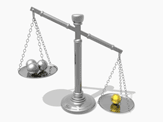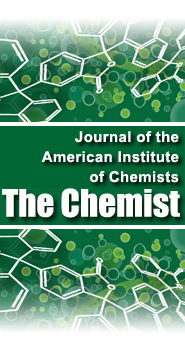Code of Ethics
Approved by the AIC Board of Directors, April 29, 1983
The profession of chemistry is increasingly important to the progress and the welfare of the community. The Chemist is frequently responsible for decision affecting the lives and fortunes of others. To protect the public and maintain the honor of the profession, the American Institute of Chemists has established the following rules of conduct.
- To uphold the law; not to engage in illegal work nor cooperate with anyone so engaged;
- To avoid associating or being identified with any enterprise of questionable character;
- To be diligent in exposing and opposing such errors and frauds as the Chemist's special knowledge brings to light;
- To sustain the institute and burdens of the community as a responsible citizen;
- To work and act in a strict spirit of fairness to employers, clients, contractors, employees, and in a spirit of personal helpfulness and fraternity toward other members of the chemical profession;
- To use only honorable means of competition for professional employment,; to advertise only in a dignified and factual manner; to refrain from unfairly injuring, directly or indirectly, the professional reputation, prospects, or business of a fellow Chemist, or attempting to supplant a fellow chemist already selected for employment; to perform services for a client only at rates that fairly reflect costs of equipment, supplies, and overhead expenses as well as fair personal compensation;
- To accept employment from more than one employer or client only when there is no conflict of interest; to accept commission or compensation in any form from more than one interested party only with the full knowledge and consent of all parties concerned;
- To perform all professional work in a manner that merits full confidence and trust; to be conservative in estimates, reports, and testimony, especially if these are related to the promotion of a business enterprise or the protection of the public interest, and to state explicitly any known bias embodies therein; to advise client or employer of the probability of success before undertaking a project;
- To review the professional work of other chemists, when request,
fairly and in confidence, whether the are:
- subordinates or employees
- authors of proposals for grants or contracts
- authors of technical papers, patents, or other publications
- involved in litigation;
- To advance the profession by exchanging general information and experience with fellow Chemists and by contributing to the work of technical societies and to the technical press when such contribution does not conflict with the interests of a client or employer; to announce inventions and scientific advances first in this way rather than through the public press; to ensure that credit for technical work is given to its actual authors;
- To work
for any client or employer under a clear agreement, preferable in writing,
as to the ownership of data, plans, improvements, inventions, designs,
or other intellectual property developed or discovered while so employed,
understanding that in the absence of written agreement:
- results based on information from the client or employer, not obtainable elsewhere, are the property of the client or employer
- results based on knowledge or information belonging to the Chemists, or publicly available, are the property of the Chemist, the client or employer being entitled to their use only in the case or project for which the Chemist was retained
- all work and results outside of the field for which the Chemist was retained or employed, and not using time or facilities belonging to a client or employer, are the property of the Chemist
- special data or information provided
by a client or employer, or created by the Chemist and belonging
to the client or employer, must be treated as confidential, used
only in general as a part of the Chemist's professional experience,
and published only after release by the client or employer;
To report any infractions of these principles of professional conduct to the authorities responsible for enforcement of applicable laws or regulations, or to the Ethics Committee of The American Institute of Chemists, as appropriate.


